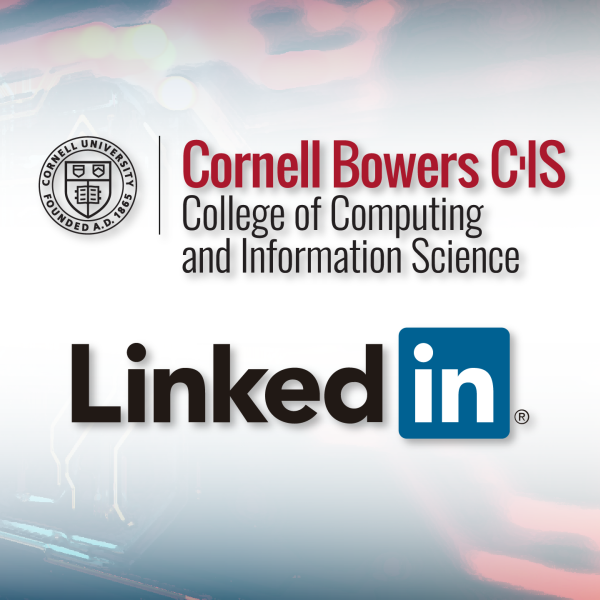August 2, 2023
By Louis DiPietro
Nine innovative faculty members and doctoral students from the Cornell Ann S. Bowers College of Computing and Information Science were selected to receive the second round of grants from the five-year, multimillion-dollar strategic partnership between the college and LinkedIn.
This year’s awards will help fund high-impact research projects on topics ranging from large language models (LLMs) and recommender systems to dynamic information retrieval and algorithmic fairness.
Now in its second year, the Cornell Bowers CIS-LinkedIn partnership – a first for both entities – continues to make good on its primary goals: provide annual funding to Cornell Bowers CIS to support doctoral students; engage faculty through research support; amplify efforts in diversity, equity, and inclusion; and establish a research connection between scientists and engineers at LinkedIn and faculty and students in Cornell Bowers CIS, one of the top artificial intelligence programs in the U.S.
Faculty award winners:
● Kilian Weinberger, professor of computer science, and Yoav Artzi, associate professor of computer science at Cornell Tech. In their project, “Real-Time Differential Search Indices,” the duo will explore Differential Search Indices (DSI) for constantly changing dynamic content – an open problem in information retrieval. DSI are considered a paradigm shift in information retrieval but are currently limited to retrieving static content only.
● Sarah Dean, assistant professor of computer science. User-provided feedback, often in the form of clicks, has powered the last decade of search and recommendation algorithms and provides platforms key insights on user engagement. However, a focus on short-term engagement metrics can lead to long-term issues like unfairness or poor platform health. In “Reliable and Efficient Recommendation & Search with Long-Term Objectives,” Dean intends to develop algorithms that make decisions on the short term while ensuring long-term platform health.
● Mor Naaman, professor of information science at Cornell Tech. Naaman’s project, “Writing with AI, Responsibly: Understanding the Potential of LLMs to Shift Our Writing, and How to Mitigate It,” will build on research into responsible AI by providing a deeper understanding of how autocomplete functions – powered by new LLMs – can transform how we express ourselves and even change our opinions.
● Cristian Danescu-Niculescu-Mizil, associate professor of information science. Humans have an intuition of when our conversations are heading south. In “Assessing the Health of Ongoing Dialogs,” Danescu-Niculescu-Mizil will develop methods for endowing artificial systems with this kind of intuition and will explore how this artificial intuition can be used to improve the way we communicate with each other, as well as with dialog systems.
Awards to doctoral students include academic year funding and discretionary funds. Awardees are:
● Princewill Okoroafor, a doctoral student in the field of computer science and advised by Robert Kleinberg, studies theoretical aspects of machine learning, especially in learning theory and reinforcement learning. His project aims to advance our understanding of limitations and trade-offs in predictive models as well as develop new algorithms that can achieve more accurate and calibrated predictions – all of which can have a significant impact on the job search industry.
● Jonathan D. Chang, a doctoral student in the field of computer science advised by Wen Sun, explores imitation learning, reinforcement learning, representation learning, and their intersection with generative models. His project, “Chatbot Recommendation Systems,” will investigate algorithms that can help reduce the amount of data needed to train reinforcement learning systems and improve responses in chatbot recommendation systems.
● Benjamin Laufer, a doctoral student in the field of information science advised by Helen Nissenbaum and Jon Kleinberg, is interested in the values and politics embedded in technology systems used to make high-impact decisions. In “Efficient, Equitable Choices in Dynamic Environments,” Laufer will develop methods for identifying, measuring, and mitigating the harmful dynamics that arise in algorithmic recommendations.
● Shira Mingelgrin, a doctoral student in the field of statistics and data science advised by Sam Wang, studies causal modeling. Mingelgrin’s project will apply causal discovery methods to investigate potential differences in the causal structure under different settings, for instance, testing whether the factors that drive hiring behavior vary among genders.
Louis DiPietro is a writer for the Cornell Ann S. Bowers College of Computing and Information Science.



